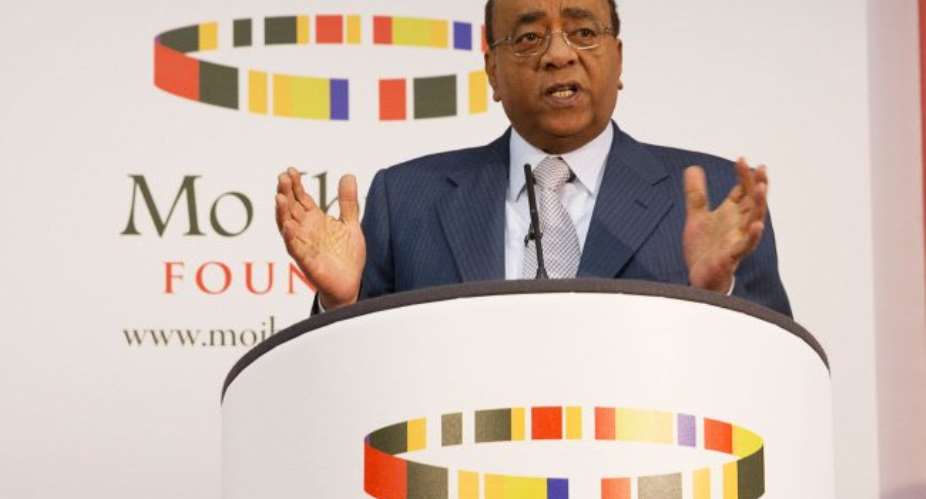The Mo Ibrahim Foundation has described as “striking” the 2018 results and trends in measuring the governance process in Africa.
The results of the 12th annual Ibrahim Index of African Governance (IIAG) will be made public on Monday October 29, 2018, a statement from the foundation has said.
The launch will be preceded by a Facebook live event to discuss the results contained in the 2018 results;
The following is the full statement;
The Mo Ibrahim Foundation (MIF) is pleased to announce the launch of the 12th annual Ibrahim Index of African Governance (IIAG), taking place on Monday 29 October 2018, when the results and analysis will be shared with the public at mo.ibrahim.foundation.
To mark the launch, Dr Mo Ibrahim will participate in a Facebook Live event to discuss this year’s striking results and the trends measuring Africa’s public governance progress.
Mo will be joined by a panel of African experts representing the continent’s growing next generation voices, Yvonne Apea Mensah from Ghana and Nasi Rwigema from South Africa, who will provide their own opinions of this year’s Index findings. The panel will also respond to questions in real time from online users.
Following the launch, MIF, in partnership with the African Peer Review Mechanism (APRM), will host a highlevel discussion on the findings on Friday, 2 November in Pretoria, South Africa. A separate media advisory will follow with the details of this event.
Global Launch of the 2018 IIAG: 29 October 2018
The IIAG is an unmatched resource providing the world’s most extensive analysis of the quality of governance in African countries. With the Index, MIF seeks to enable governments, citizens, business, academia, policy makers and analysts to use its findings as a tool to assess accurately the delivery of public goods and services and drive conversations about governance in Africa. As such, the data are made freely available each year via the IIAG Data Portal (iiag.online).
• The 2018 IIAG launch will take place online during a 30-minute Facebook Live event with Mo and two African next generation voices, taking the discussion directly to the public to encourage dialogue across social media using the hashtags #IIAG and #AskMIF.
• With ten years of data to draw from, the 2018 IIAG is uniquely positioned to measure trends governance, providing in-depth analysis on how the quality of governance has changed over the past five years (2013-2017) within the context of the last decade (2008-2017), and what has or could be key to Africa’s transformation.
• In every iteration, MIF – assisted by the IIAG’s Advisory Council – looks at improving the structure, components and methodology of the IIAG. Due to this annual revision, every year MIF recalculates
all scores in the Index.
• Previous iterations of the IIAG covered data from 2000 onwards. The 2018 IIAG is for the first time providing comparable governance data for the last decade only, to strengthen the robustness of the findings.
• For the first time, an assessment of youth inclusion is part of the IIAG. Through the indicator Promotion of Socio-economic Integration of Youth (provided by Global Integrity), the Index assesses whether there is a government policy/strategy to increase the socio-economic integration of youth.
• This year’s IIAG will have the added focus of analysing the data through thematic frameworks and broader themes including: economic opportunity for Africa’s citizens, the demographic dividend, transparency and accountability.
• The ten-year time series includes the most recent governance performances, raising the bar in areas such as Health, where countries should benchmark themselves to more current standards.
• The IIAG contains analysis across 102 indicators from 35 independent African and global data institutions to cover all 54 African countries in the areas of Safety & Rule of Law, Participation & Human Rights, Sustainable Economic Opportunity and Human Development.
• The Data Portal is a user-friendly interface that offers a bespoke analysis of governance ranks, scores and trends for each country. Users can create printable charts and graphics from the data.





 Meta releases new version of conversational AI across its platforms
Meta releases new version of conversational AI across its platforms
 Cape Town named Africa’s Best Airport 2024 by Skytrax
Cape Town named Africa’s Best Airport 2024 by Skytrax
 Bono East: Four injured after hearse transporting corpse crashes into a truck
Bono East: Four injured after hearse transporting corpse crashes into a truck
 ‘Be courageous, find your voice to defend our democracy’ — Sam Jonah urges journ...
‘Be courageous, find your voice to defend our democracy’ — Sam Jonah urges journ...
 Exodus of doctors, nurses and teachers have worsened because of unserious Akufo-...
Exodus of doctors, nurses and teachers have worsened because of unserious Akufo-...
 2024 election: Avoid insults, cutting down people in search of power – National ...
2024 election: Avoid insults, cutting down people in search of power – National ...
 ‘You passed through the back door but congratulations’ — Atubiga on Prof Jane Na...
‘You passed through the back door but congratulations’ — Atubiga on Prof Jane Na...
 Government’s $21.1 billion added to the stock of public debt has been spent judi...
Government’s $21.1 billion added to the stock of public debt has been spent judi...
 Akufo-Addo will soon relocate Mahama’s Ridge Hospital to Kumasi for recommission...
Akufo-Addo will soon relocate Mahama’s Ridge Hospital to Kumasi for recommission...
 We must not compromise on our defence of national interest; this is the time to ...
We must not compromise on our defence of national interest; this is the time to ...
